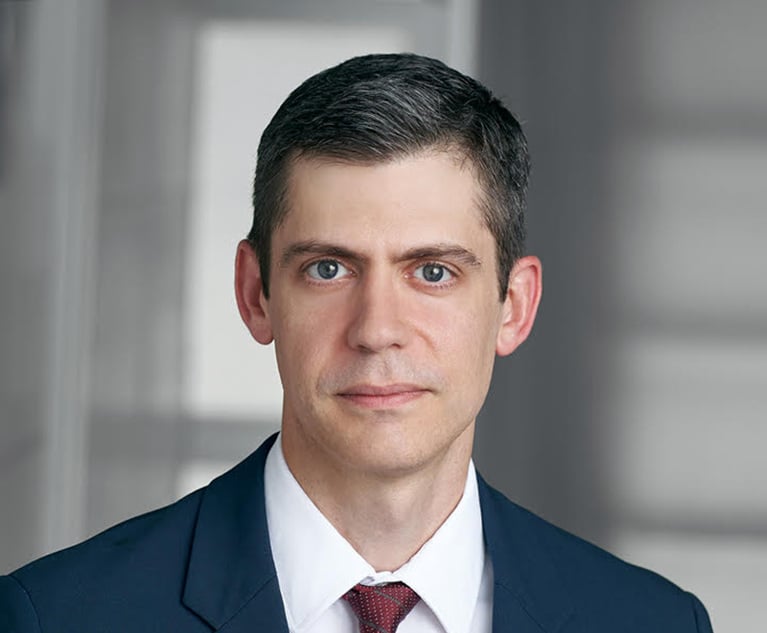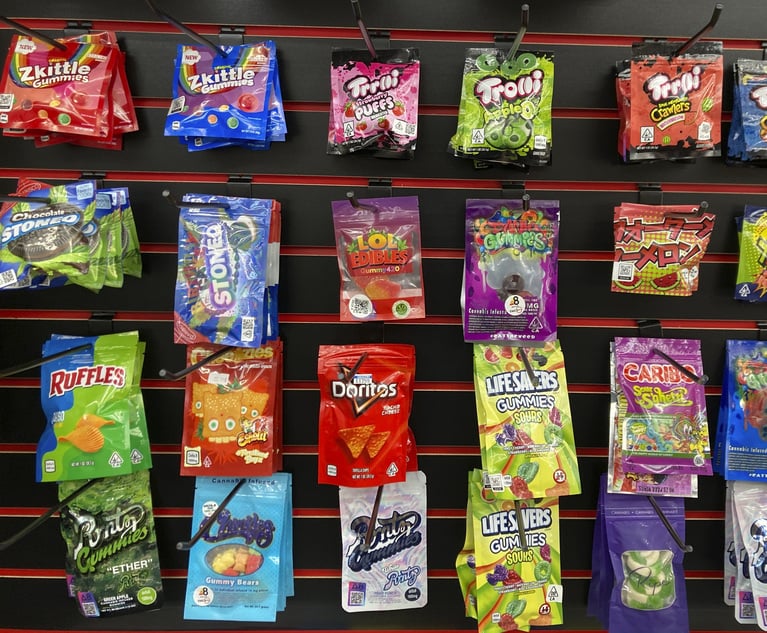Higher Law: Bipartisan Breakthrough on Marijuana? | See What the 9th Circuit Just Said About State-Federal Tension | Plaintiffs Firms Circle
Welcome to Higher Law -- our weekly snapshot of cannabis lawyering, lobbying and legislating. Thanks for reading!
July 11, 2019 at 04:00 PM
9 minute read
Welcome back to Higher Law, our weekly briefing on all things cannabis. I'm Cheryl Miller, reporting for Law.com from Sacramento. Weren't you all supposed to be on vacation last week for the Fourth of July holiday? It doesn't seem like you were given all the marijuana-related news happening.
This week we've got a recap of the brief bipartisan agreement on marijuana laws at a congressional hearing. Plus, the Ninth Circuit dived into the state-federal conflict on cannabis legality, again. A Canadian cannabis company is in trouble with federal regulators–and plaintiffs lawyers. And a Florida appellate court says no to the Sunshine State's vertical integration model for marijuana.
Thanks as always for reading. You may not be taking a vacation, but I am. Higher Law will be on hiatus next week. But keep those story ideas and tips coming. Drop me a line at [email protected]. Or you can call me at 916-448-2935. Follow me on Twitter @capitalaccounts. See you again on July 25.

Bipartisan Breakthrough on Marijuana?
For a moment, albeit a fleeting one, congressional Democrats and Republicans on Wednesday agreed on marijuana regulation. Members on both sides of the aisle in a House judiciary subcommittee hearing—"Marijuana Laws in America: Racial Justice and the Need for Reform"—said the current state-federal conflict over cannabis laws is not sustainable.
"Marijuana decriminalization may be one of the very few issues upon which bipartisan agreement can still be reached in this session," said Congressman Tom McClintock, R-California.
But then McClintock poked Democrats for playing "the race card" by noting the disproportionate number of African Americans and Latinos doing time for marijuana crimes. "The fact is our marijuana laws have badly served all of us," McClintock said, killing the bipartisan buzz.
"Until his last paragraph I was preparing to say I have the pleasure of agreeing with every word that the distinguished member from California had said," said Judiciary Committee Chairman Jerry Nadler, D-New York (above). "Enforcement of marijuana laws has been done in a racially disparate manner. The effects have been disparate. To point that out and to seek to cure that is not to inflict racial divisions, it's simply to point out a fact of life."
Still, the hearing was notable for members of both parties expressing support for giving states authority to set up their own marijuana regulatory schemes. NORML political director Justin Strekal called the day "historic."
"Members of both political parties demonstrated a desire to reform our nation's failed policy of prohibition and the only disagreement was HOW, not IF," Strekal said in a prepared statement.
>>> One of the witnesses who testified Wednesday was Marilyn Mosby, state's attorney for Baltimore city. Mosby announced in January that her office would no longer prosecute marijuana possession cases. You can read her prepared testimony here and watch a replay of the subcommittee hearing here.

9th Circuit on State-Federal Marijuana Conflict
"We must decide, once again, whether marijuana growers may enjoin federal prosecution in a state which has legalized medical use."
That was the opening sentence of a decision this week by the U.S. Court of Appeals for the Ninth Circuit, which held that three marijuana workers in Washington could not escape federal prosecution under the Controlled Substances Act just because medical marijuana is legal in the state.
More specifically, the Ninth Circuit panel said that defendants—not the federal government as the defendants had argued—had the burden of proving that they were complying with Washington's Medical Use of Cannabis Act. A district court found that the defendants were smoking weed while trimming marijuana plants but could not prove they were qualifying patients under the state's medical-use law.
Senior U.S. Circuit Judge Diarmuid F. O'Scannlain (above) wrote the opinion for the panel, which also included Circuit Judges Carlos Bea and Michelle Friedland.
Nicolas Vieth of Vieth Law Offices in Idaho and David Miller of Miller & Prothero argued on behalf of the defendants. Assistant U.S. Attorney Timothy Ohms argued for the government.
Plaintiffs Firms Circling Canada's CannTrust
Attorneys working with the cannabis industry have beaten this refrain into my head: being a good cannabis lawyer is not about being an expert about marijuana, it's about being a good all-around lawyer.
That really hit home with me this week when I saw the avalanche of notices from plaintiffs firms considering, or already pursuing, securities litigation against CannTrust Holdings. That's the Ontario, Canada marijuana producer in trouble with regulators for allegedly growing pot in unlicensed rooms.
Health Canada has placed a hold on more than 16,000 pounds of dried cannabis grown at the site deemed non-compliant. CannTrust is voluntary withholding additional product from the market pending a review. The company's stock has dropped 40 percent since news of the regulatory trouble broke, according to Bloomberg.
"We have made many changes to make this right with Health Canada," CannTrust CEO Peter Aceto said in a prepared statement. "We made errors in judgement, but the lessons we have learned here will serve us well moving forward."
Who Got the Work
• He doesn't have the work yet, but Barry Grissom, corporate counsel for cannabis business advisory firm Electrum Partners, has announced he's running to represent the state of Kansas in the U.S. Senate. Grissom is a former U.S. attorney for the Jayhawk State, has said his six years as the top federal prosecutor in Kansas convinced him that labeling marijuana as a Schedule 1 drug is "absurd."
• Members of the International Cannabis Bar Association have elected a new roster of directors for the 2019-2021 term: Mary Shapiro of Evoke Law; Joanna Hossack of Clark Neubert; Matthew Abel of Cannabis Counsel; Karen Berstein of Bernstein IP; Shay Gilmore of the Law Office of Shay Aaron Gilmore; and Jason Horst of Horst Legal Counsel.
• Troy Morgan has joined Curaleaf Holdings as senior vice president of compliance for the Massachusetts-based cannabis company. Before coming to Curaleaf, Morgan was head of compliance biotechnology company Sanofi Genzyme.
• He may have 99 Problems but strategizing for a cannabis company won't be one. Hip-hop mogul Jay-Z (also known as Shawn Carter and Mr. Beyonce) announced this week that he's partnering with California brand Caliva as a chief brand strategist. An advocate of legalization, Jay-Z said he wants to help those who previously served time find a place in the industry.

In the Weeds
>>> New legislation would open the Small Business Administration to cannabis operators. Three U.S. House Democrats say their legislation, H.R. 3540, would make "direct or indirect" marijuana businesses eligible for SBA-backed loans and disaster assistance. At a congressional hearing last month, cannabis business advocates testified that the lack of access to capital and SBA programs that other startups enjoy makes pot-repreneurs vulnerable to predatory lending and business practices. [U.S. House Committee on Small Business]
>>> The ex-GC of three-related CBD companies is suing his former employer, alleging that they failed to pay him and his wife promised stock options and salary. Peter Borghetti and Cherylann Borghetti filed suit against Pittsburgh-based CBD USA Grown Inc., KMA Holdings Group and Greenleaf Golden Enterprises in the U.S. District Court for the Western District of Pennsylvania. The Borghettis are represented by Morella & Associates attorney Justin Papciak. [The Legal Intelligencer] Read the complaint.
>>> Florida's vertical integration rules on medical marijuana are unconstitutional, an appellate court held this week. The First District Court of Appeal ruled that requiring cannabis operators to grow, process and distribute cannabis and related products has created an "oligopoly." While the decision "raises certain questions as to how Florida's medical marijuana industry will be regulated in the future, it will not result in any immediate changes and is not the final word from the courts on the issue," Jim McKee, an attorney who represents medical marijuana operators told The News Service of Florida. [Daily Business Review]
>>> Cannabis companies should negotiate "exit ramps" in their leases. That's the advice of Katy Young, managing partner of San Francisco firm Ad Astra and president of the International Cannabis Bar Association. If a license falls through, ""you'll want to be able to terminate the lease." Don't forget to include provisions for fixtures, such as lights for indoor grows, she said. [GlobeSt.com]
>>> Michigan has a new set of emergency rules for its recreational market.The Marijuana Regulatory Agency will begin accepting business license applications Nov. 1. MLive.com has highlighted 11 things potential applicants should know about those rules. [MLive.com]
>>> New federal hemp rules are coming faster than thought. The U.S. Department of Agriculture says it will introduce the rules in August, not next year as originally planned. The regulations are expected to address such things as land use, testing standards, disposal, law enforcement compliance, inspections and certification for products and industry workers. [Hemp Today]

Calendar: All the Things
July 17 - Sheppard Mullin hosts the webinar "Hemp-CBD: Enabling Growth by Managing Legal Risks." Scheduled presenters are partner Allison Fulton and associate Sarah Blitz.
July 18 - Duane Morris presents the webinar "Cannabis 203: Investing in Cannabis." Presenters include associate Justin Santarosa and partner Michael Schwamm.
July 22 - The International Cannabis Bar Association hosts The Cannabis Regulatory Rounds in San Jose, California. Panels will review cultivation and compliance compliance issues, cannabis law ethics and post-Farm Bill manufacturing and distribution challenges.
July 22-24 - The National Cannabis Industry Association hosts the Cannabis Business Expo & Summit in San Jose.
This content has been archived. It is available through our partners, LexisNexis® and Bloomberg Law.
To view this content, please continue to their sites.
Not a Lexis Subscriber?
Subscribe Now
Not a Bloomberg Law Subscriber?
Subscribe Now
NOT FOR REPRINT
© 2025 ALM Global, LLC, All Rights Reserved. Request academic re-use from www.copyright.com. All other uses, submit a request to [email protected]. For more information visit Asset & Logo Licensing.
You Might Like
View All
NY Cannabis Marketing Rulings / Rescheduling Effects / Honigman's Work on Trademark Suit / Goodbye
9 minute read
Workplace Weed and Labor Pacts / State AGs and Hemp / Maryland Licensing Suit / Vicente Sues Recruiter
9 minute readTrending Stories
- 1Public Notices/Calendars
- 2Wednesday Newspaper
- 3Decision of the Day: Qui Tam Relators Do Not Plausibly Claim Firm Avoided Tax Obligations Through Visa Applications, Circuit Finds
- 4Judicial Ethics Opinion 24-116
- 5Big Law Firms Sheppard Mullin, Morgan Lewis and Baker Botts Add Partners in Houston
Who Got The Work
J. Brugh Lower of Gibbons has entered an appearance for industrial equipment supplier Devco Corporation in a pending trademark infringement lawsuit. The suit, accusing the defendant of selling knock-off Graco products, was filed Dec. 18 in New Jersey District Court by Rivkin Radler on behalf of Graco Inc. and Graco Minnesota. The case, assigned to U.S. District Judge Zahid N. Quraishi, is 3:24-cv-11294, Graco Inc. et al v. Devco Corporation.
Who Got The Work
Rebecca Maller-Stein and Kent A. Yalowitz of Arnold & Porter Kaye Scholer have entered their appearances for Hanaco Venture Capital and its executives, Lior Prosor and David Frankel, in a pending securities lawsuit. The action, filed on Dec. 24 in New York Southern District Court by Zell, Aron & Co. on behalf of Goldeneye Advisors, accuses the defendants of negligently and fraudulently managing the plaintiff's $1 million investment. The case, assigned to U.S. District Judge Vernon S. Broderick, is 1:24-cv-09918, Goldeneye Advisors, LLC v. Hanaco Venture Capital, Ltd. et al.
Who Got The Work
Attorneys from A&O Shearman has stepped in as defense counsel for Toronto-Dominion Bank and other defendants in a pending securities class action. The suit, filed Dec. 11 in New York Southern District Court by Bleichmar Fonti & Auld, accuses the defendants of concealing the bank's 'pervasive' deficiencies in regards to its compliance with the Bank Secrecy Act and the quality of its anti-money laundering controls. The case, assigned to U.S. District Judge Arun Subramanian, is 1:24-cv-09445, Gonzalez v. The Toronto-Dominion Bank et al.
Who Got The Work
Crown Castle International, a Pennsylvania company providing shared communications infrastructure, has turned to Luke D. Wolf of Gordon Rees Scully Mansukhani to fend off a pending breach-of-contract lawsuit. The court action, filed Nov. 25 in Michigan Eastern District Court by Hooper Hathaway PC on behalf of The Town Residences LLC, accuses Crown Castle of failing to transfer approximately $30,000 in utility payments from T-Mobile in breach of a roof-top lease and assignment agreement. The case, assigned to U.S. District Judge Susan K. Declercq, is 2:24-cv-13131, The Town Residences LLC v. T-Mobile US, Inc. et al.
Who Got The Work
Wilfred P. Coronato and Daniel M. Schwartz of McCarter & English have stepped in as defense counsel to Electrolux Home Products Inc. in a pending product liability lawsuit. The court action, filed Nov. 26 in New York Eastern District Court by Poulos Lopiccolo PC and Nagel Rice LLP on behalf of David Stern, alleges that the defendant's refrigerators’ drawers and shelving repeatedly break and fall apart within months after purchase. The case, assigned to U.S. District Judge Joan M. Azrack, is 2:24-cv-08204, Stern v. Electrolux Home Products, Inc.
Featured Firms
Law Offices of Gary Martin Hays & Associates, P.C.
(470) 294-1674
Law Offices of Mark E. Salomone
(857) 444-6468
Smith & Hassler
(713) 739-1250










